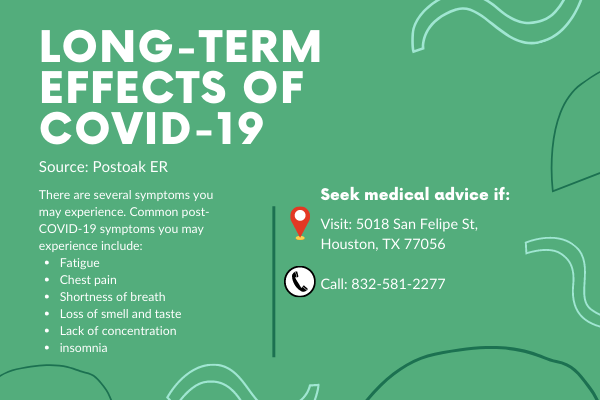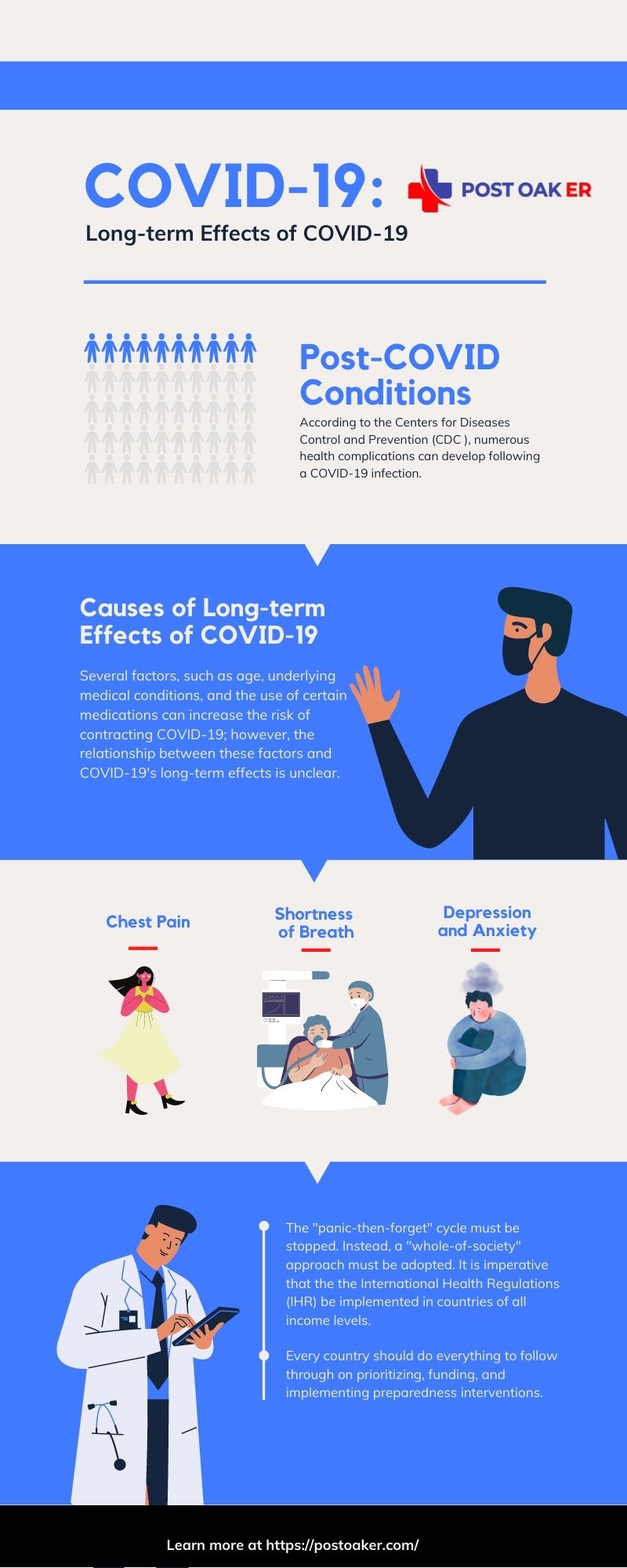Key Takeaways
- Long COVID refers to ongoing or new health problems that occur after COVID-19 infection.
- Symptoms can last weeks, months, or longer and may affect multiple body systems.
- Anyone who has had COVID-19—including children and people with mild illness—can develop Long COVID.
- There is no single test or universal treatment; care focuses on symptom management.
- Preventing COVID-19 infection and severe illness helps reduce the risk of Long COVID.
- Medical evaluation is recommended for persistent or worsening symptoms.
Introduction
Long COVID—also known as Post-COVID Conditions or post-acute sequelae of SARS-CoV-2 infection (PASC)—describes a range of health problems that can occur after a person has had COVID-19. These problems may begin during the initial infection or appear weeks to months later. Symptoms can persist, fluctuate, improve, or worsen over time. Long COVID can affect people of any age, including children, and can occur even after a mild initial illness.
Medical understanding of Long COVID continues to evolve. This article presents only information supported by high-quality, authoritative sources.
What Is Long COVID?
Long COVID is a chronic condition that develops after infection with SARS-CoV-2, the virus that causes COVID-19. It includes a wide range of symptoms or conditions that last for weeks, months, or longer after the acute illness.
Some definitions require symptoms to be present for at least three months after infection, while others recognize symptoms that persist beyond four weeks.
Symptoms may:
- Begin during the initial illness and never fully resolve
- Disappear and later return
- Appear for the first time after apparent recovery
How Long Do Long-Term Effects Last?
The duration of Long COVID varies widely:
- Some people recover within weeks or months.
- Others experience symptoms that last much longer or fluctuate over time.
There is no single recovery timeline that applies to everyone.
Common Symptoms
Long COVID can affect multiple body systems. Not all people experience the same symptoms, and severity can vary.
Fatigue and Activity Intolerance
- Persistent fatigue
- Symptoms that worsen after physical or mental activity (post-exertional malaise)
Breathing and Heart Symptoms
- Shortness of breath
- Persistent cough
- Chest pain or tightness
- Rapid or irregular heartbeat
Brain and Nervous System
- Difficulty concentrating or memory problems (“brain fog”)
- Headaches
- Dizziness
Sleep and Autonomic Symptoms
- Insomnia or poor sleep quality
- Lightheadedness or rapid heart rate when standing
Mental Health
- Anxiety
- Depression
Smell and Taste
- Loss or distortion of smell or taste
This is not a complete list. Symptoms can change over time and differ from person to person.
Less Common but Serious Complications
Some people develop more serious health problems after COVID-19 that require medical evaluation. These can include:
- Heart conditions, such as inflammation of the heart muscle
- Lung damage
- Neurologic complications
- Blood clotting problems
Who Is at Higher Risk?
Anyone who has had COVID-19 can develop Long COVID. However, it occurs more often in:
- People who had severe COVID-19 illness, especially those hospitalized or treated in intensive care
- Older adults
- People with underlying medical conditions
- People who experience repeated SARS-CoV-2 infections
Children and adolescents can also develop Long COVID, although symptoms and severity may differ from adults. Social, economic, and healthcare access factors can influence outcomes.
Why Does Long COVID Happen?
The exact causes of Long COVID are not yet fully understood. Research is ongoing. Proposed mechanisms include:
- Ongoing inflammation
- Immune system changes
- Effects of COVID-19–related damage to organs or blood vessels
No single cause has been confirmed.
How Long COVID Is Diagnosed
There is no single test that can diagnose Long COVID. Diagnosis is typically based on:
- A review of symptoms and their timing
- Discussion of current or prior COVID-19 infection (a positive test is not always required)
- Physical examination and tests to rule out other conditions
In some cases, routine tests may appear normal even when symptoms are present.
Treatment and Management
There is no one-size-fits-all treatment for Long COVID. Care focuses on managing symptoms and supporting recovery. Management may include:
- Symptom-directed medications
- Physical or respiratory therapy
- Careful pacing of activity to reduce symptom flare-ups
- Mental health support
Some people benefit from specialized post-COVID or rehabilitation clinics. Treatment plans are typically individualized.
Prevention and Risk Reduction
Preventing COVID-19 infection and severe illness helps reduce the risk of Long COVID. Staying up to date with COVID-19 vaccination is currently the best available tool to lower risk. Preventing reinfection and severe outcomes also reduces the likelihood of long-term complications.
When to See a Doctor
See a Doctor If You Experience:
- Symptoms that last weeks or months after COVID-19
- New or worsening symptoms
- Difficulty returning to work, school, or daily activities
Seek Emergency Care Immediately For:
- Chest pain
- Severe shortness of breath
- Sudden confusion
- Fainting
- Signs of stroke or heart attack
Frequently Asked Questions
What is Long COVID?
Long COVID refers to ongoing or new health problems that occur after a COVID-19 infection and persist for weeks, months, or longer.
What are common Long COVID symptoms?
Common symptoms include fatigue, shortness of breath, brain fog, sleep problems, and mood changes, though symptoms vary widely.
Can mild COVID lead to Long COVID?
Yes. Long COVID can occur even after mild or asymptomatic COVID-19 infection.
Can children get Long COVID?
Yes. Children and adolescents can develop Long COVID, though symptoms and severity may differ from adults.
How long does Long COVID last?
There is no single answer. Some people recover within months, while others have symptoms that last much longer.
Can COVID cause long-term or permanent damage?
Some people experience lasting complications after COVID-19. Outcomes vary, and ongoing medical follow-up can help evaluate and manage potential long-term effects.
How common is Long COVID?
There is no high-quality evidence supporting a single, definitive rate that applies to all populations.
APA References List
Centers for Disease Control and Prevention. (2025, July 24). Living with Long COVID. https://www.cdc.gov/long-covid/living-with/index.html
Centers for Disease Control and Prevention. (2025, July 24). Long COVID basics. https://www.cdc.gov/long-covid/about/index.html
Centers for Disease Control and Prevention. (2025, July 24). Long COVID signs and symptoms. https://www.cdc.gov/long-covid/signs-symptoms/index.html
Johns Hopkins Medicine. (2022, June 14). Long COVID: Long-term effects of COVID-19. https://www.hopkinsmedicine.org/health/conditions-and-diseases/coronavirus/covid-long-haulers-long-term-effects-of-covid19
National Academies of Sciences, Engineering, and Medicine. (2024). A long COVID definition: A chronic, systemic disease state with profound consequences. The National Academies Press. https://doi.org/10.17226/27768
World Health Organization. (2021, October 6). A clinical case definition of post COVID-19 condition by a Delphi consensus, 6 October 2021. https://www.who.int/publications/i/item/WHO-2019-nCoV-Post_COVID-19_condition-Clinical_case_definition-2021.1


